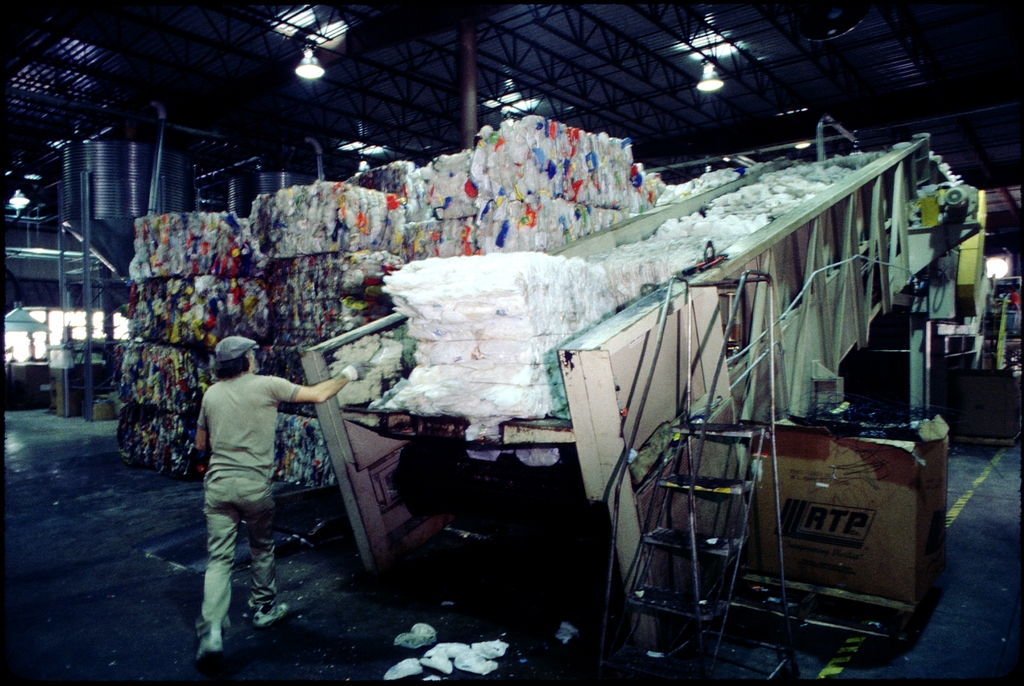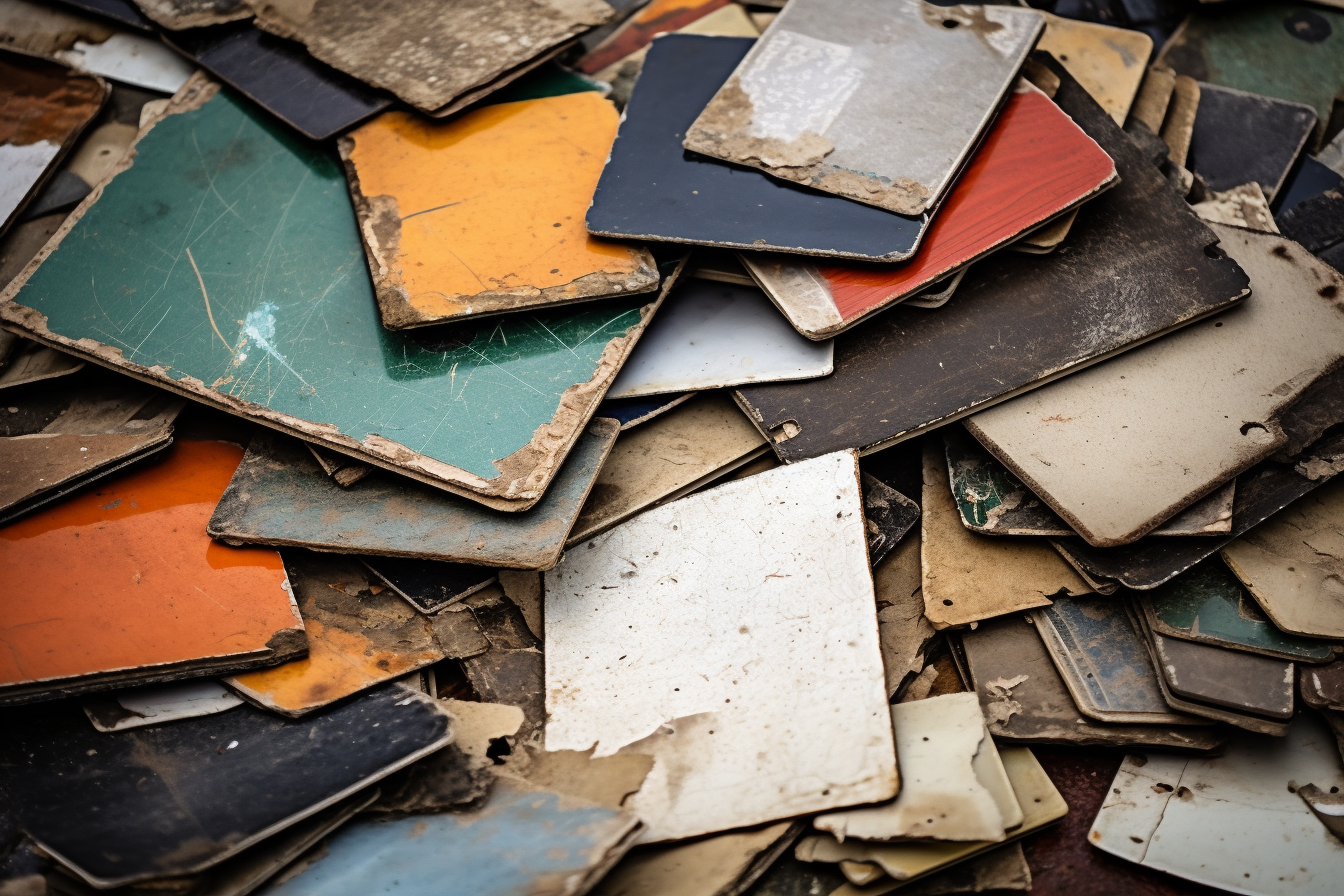[ad_1]
This text was written by Burgess Brown. Wholesome Supplies Lab is a design analysis lab at Parsons College of Design with a mission to put well being on the middle of each design choice. HML is altering the way forward for the constructed atmosphere by creating sources for designers, architects, academics, and college students to make more healthy locations for all folks to stay. Take a look at their podcast, Hint Materials.
Between 1950 and 2019, greater than 7,000 million metric tons of plastic waste have been generated. We add roughly 400 million metric tons to that determine yearly. In case your eyes glazed over whereas studying these frankly incomprehensible numbers, simply know that our plastic waste drawback is uncontrolled. Recycling, the answer lengthy promoted by the plastics trade as a panacea, is deeply flawed at greatest and fully unfeasible at worst.
So, if recycling as we all know it gained’t save us, what can we do with the mounds of plastic clogging our waterways and landfills? Even when we may recycle plastics successfully at scale, does it make sense to recycle a poisonous plastic like Luxurious Vinyl Tile?
This text is Half III of a three-part collection on the hazards of vinyl flooring.
- Half I explores the “soiled local weather secret” behind the favored materials and shares some more healthy, reasonably priced options.
- Half II considers the lengthy historical past of employee endangerment by the vinyl trade and the way this legacy continues in China at present.
- Half III, this text, explores the darkish facet of recycling.
The Guilt Eraser

Municipal Stable Waste – Employee in recycling facility, The U.S. Nationwide Archives, Library of Environmental Pictures, (ORD), picture by way of GetArchive
As early because the Seventies, plastics trade officers warned that efficient recycling of plastic wasn’t possible. One stated in a 1974 speech that “there may be critical doubt that [recycling plastic] can ever be made viable on an financial foundation.” And but, the plastics trade cast forward with its recycling messaging. Plastic’s enemy primary was the guilt folks felt concerning the wastefulness of single use merchandise. So even when the trade wasn’t truly recycling or defending the atmosphere, they wanted shoppers to assume that they have been.
One trade lobbyist known as recycling the nice “guilt-eraser”. “Recycling assures those that plastic isn’t simply an infernal hanger-on; it has a helpful afterlife. As quickly as they recycle your product,” he defined, “they really feel higher about it.”
All through the ‘90s, as environmental pushback mounted, the plastics trade fought again. Recycling was their most essential message, in order that they unfold it far and extensive. The trade spent over $250 million on public campaigns concerning the usefulness of plastic and its potential to be reused. They needed folks to really feel protected and comfy with their merchandise. In addition they invested thousands and thousands in recycling efforts, however these efforts have come up dramatically quick. In 2021, the U.S. (by far the world’s greatest plastics polluter) solely recycled round 5% of plastics.
We spoke to Kara Napolitano who’s the Training and Outreach Coordinator for the Sims Municipal Recycling Middle in Brooklyn, New York for an episode of our podcast, Hint Materials. We cowl the sordid historical past of plastics recycling and its unsure future. Kara, who lives and breathes recycling, had this to say about how we should always set our plastics priorities:
“My job is to show folks about recycling. However I’ve to convey consideration to the truth that recycling is just midway up that waste hierarchy of most popular strategies for managing our waste. Recycling just isn’t primary. Recycling won’t save us. On the very prime of that waste hierarchy — probably the most most popular factor to do to handle your waste — is to not create any waste within the first place.”
Kara reminded us that the well-known waste administration hierarchy goes: “Scale back. Reuse. Recycle.” If we’re to reverse the course of our plastics disaster, we should focus our efforts on drastically decreasing manufacturing and consumption of plastic all collectively.
The Poison Plastic

Picture generated by Architizer utilizing Midjourney
There are many questions that want answering about the way forward for recycling. Whereas there may be consensus that we should always give attention to decreasing plastics manufacturing, there are debates raging about what to do with the mounds of plastic we’ve already created. There’s, nevertheless, no query about PVC’s place in that future. From a well being standpoint, PVC has no place in a round plastics economic system.
That’s as a result of PVC is poisonous at each stage of its life cycle. The constructing block of PVC, vinyl chloride, is a recognized human carcinogen. Then there are efficiency components: plasticizers to make PVC versatile can disrupt the physique’s endocrine system and heavy metals used to make it inflexible are poisonous too. These poisonous chemical compounds are within the thousands and thousands of houses throughout the nation that make the most of the primary flooring alternative within the US: Luxurious Vinyl Tile. And, these harmful chemical compounds don’t magically disappear if PVC is recycled. When firms promote recycled LVT or tout its potential to enter the round economic system, ask your self: Would I paint my home with recycled lead paint?
Problematic and Pointless
The U.S. Plastics Pact is a bunch of “stakeholders throughout the plastics worth chain” which can be making an attempt to create a round economic system for plastics in america. To be clear, this group is actually not anti-plastics nor anti-recycling. But, they’ve labeled PVC plastic to be a “problematic and pointless” materials and are working to remove it from all packaging by 2025. It is because PVC is “not at present reusable, recyclable or compostable with current U.S. infrastructure at scale” and “accommodates hazardous chemical compounds or creates hazardous situations that pose a major threat to human well being or the atmosphere (making use of the precautionary precept) throughout its manufacturing, recycling (whether or not mechanical or chemical), or composting course of.”
PVC is extremely tough to recycle and it interferes with the recyclability of different plastics too. Even when recycling PVC at scale could possibly be discovered, its carcinogenic and endocrine disrupting chemical compounds stay. These chemical compounds pose a menace to residents within the use section and once more to people and the planet at disposal. The overwhelming majority of PVC results in landfills and incinerators. When PVC is burned, a bunch of poisonous chemical compounds, together with dioxins, are launched into the air, soil and water. Whereas there could also be hope for a future the place some plastics are capable of be successfully recycled at scale, PVC mustn’t and won’t be part of that future.
Rethink, Redesign, Reform
We should always proceed to assist improvements in plastics recycling. Thrilling progress is being made within the subject of organic recycling, which makes use of enzymes from micro organism, fungi and bugs to interrupt plastics down into their part elements. This permits for theoretically infinite recycling of plastics that might have a smaller carbon footprint than making virgin plastics.
What we should always not do is proceed to make use of recycling as a guilt eraser. No improvements in recycling can justify the continued manufacturing of supplies as poisonous as PVC, and subsequently LVT. The best factor that we as designers and designers can do to guard people and our planet, is cease specifying plastics (particularly PVC) wherever potential. Partly certainly one of this collection we shared an inventory of wholesome, reasonably priced options to vinyl flooring. You’ll find different totally vetted flooring choices in our supplies assortment on the Wholesome Supplies Lab web site.
We’ll depart you with a re-imagining of the waste administration hierarchy (“scale back, reuse, recycle”) talked about earlier from Chief Scientist of Environmental Well being Sciences and good friend of Wholesome Supplies Lab, Pete Myers:
Re-Suppose
Many functions of plastics are non-essential. Critical efforts needs to be made to determine the important makes use of of plastics vs. non-essential.
Redesign
Chemists needs to be given the problem of making safer supplies to make use of when the providers of plastic are required.
Reform
The regulatory system must be reformed by incorporating twenty first century biomedical science in its assessments of security.
As architects and designers our cost as pivotal members of the design and development trade is to re-think the design choice making course of that has been “enterprise as standard” for the final a number of many years. If we put the well being of our our bodies, the planet, and all these dwelling there on the middle of our design selections, the best way we construct will seriously change. That considering has to increase to the complete lifecycle of the supplies we use.
If we take into account their affect from the time they depart the earth to the time they’re returned to the earth, we can have no alternative however to re-design our programs of manufacturing. These shifts in considering will depart no place for poisonous plastics or every other toxics in our work. Centering human and ecosystem well being in design and development will positively change the longer term for everybody.
Architizer is thrilled to announce the winners of the eleventh Annual A+Awards! Desirous about taking part subsequent season? Join key details about the twelfth Annual A+Awards, set to launch this fall.
[ad_2]
Source link



